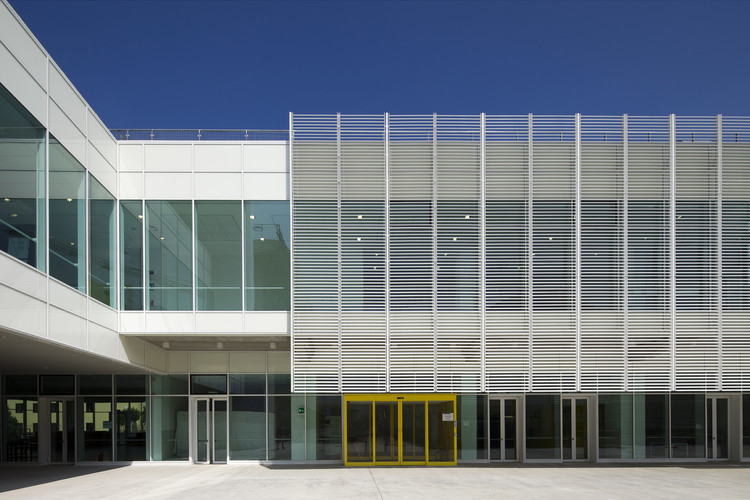
-
Architects: Paolo Bodega Architettura
- Area: 16250 m²
- Year: 2020
-
Photographs:Beppe Raso

Text description provided by the architects. Development of the new University Center in the southern part of the city of Lecco is an evolution of the preliminary project prepared by the Polytechnic University of Milan and is the winner of a tender. The area is crossed by Antonio Ghislanzoni street, which divides the space into different destinations: to the north-east, adjacent to the railway line, are the market space and the new green spaces; to the south-west, overlapping with the area of the old disused hospital, is the new university facilities site. The project offers solutions with a low architectural and energy impact, thus completely fulfilling the client's requirements.

The project is based on the need to create a university center that would guarantee a synergistic-osmotic relationship with the city of Lecco while identifying and offering services currently unavailable in the city that could be shared for the common benefit. The program, therefore, offers to surpass a model of a Center or a Campus and rather create a structure that would become an integral part of the Lecco urban fabric. Two routes are envisaged for the intervention, which coincides with the two main pedestrian walkways through the area: Ghislanzoni street will allow the direct link of the university open spaces to the new urban park, while the second walkway, perpendicular to the latter and within the area, will connect the academic facilities to the public ones.



Sized to house 2,000 students in approximately 17,000 sq.m. of floor space, it comprises a New Building containing classrooms and laboratories and two refurbished Historic Buildings with their characteristic ‘fishbone’ arrangement typical for the hospital structures which accommodate offices and departments. Purposefully open and democratic, this place in the middle of the urban fabric has become a generator and promoter of science to those walking past and looking at the Polytechnic windows, that encourage to reprive in the wireless garden connected to the world. The building characterised by qualities such as lightness, transparency, brightness, perspective permeability, it represents a symbol of culture and a spirit of innovation. Its materials and colors are linked to the history of the place and its symbolism.

The importance of the project also lies in technology and energy efficiency according to the principles of eco-sustainability. The new building is entirely composed of modular resistant structures made of concrete and light high-performance elements in aluminum, steel, and glass for the envelopes. Transparent, opaque layers, 12 km of brise-soleil sun breakers, extruded, filtering, and photovoltaic elements are applied over the precast concrete elements and 0.8 km of the dynamic wings for better control of solar radiation.


This building meets the energy class B with local renewable energy sources such as water, sun, air used for control of energy consumption and CO2 emissions. Its heating services work with a modular system of heat pumps that uses groundwaters. There are photovoltaic panels producing 20 kW of electricity, solar thermal collectors producing hot water, and a vertical wind rotor, all placed at the top of the envelopes.






















.jpg?1596689602)






























